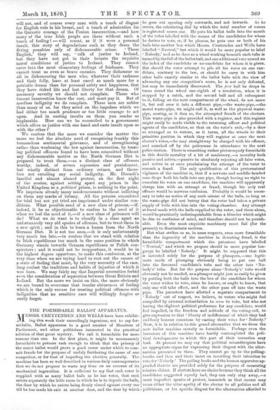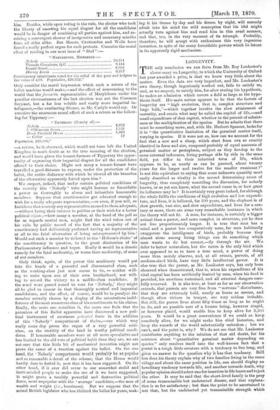THE FORMIDABLE BALLOT APPARATUS.
MESSRM t S. CRUTTENDEN AND WELLS have been exhibit this week their exceedingly ingenious, not to say for- midable, Ballot apparatus to a good number of Members of Parliament, and other politicians interested in the practical solution of that great mystery. We call it formidable for more reasons than one. In the first place, it might be uncommonly formidable to persons rash enough to think that the privacy of the secret ballot would prove a good cover under which to com- mit frauds for the purpose of unduly furthering the cause of one competitor, or for that of impeding the election generally. The machine has been so well described in various daily contemporaries that we do not propose to waste any time on an account of its mechanical ingenuities. It is sufficient to say that each voter is supplied with as many ballot balls as he has votes, that each enters separately the little room iu which he is to deposit the balls, the door by which he enters being firmly closed against every one till he has made his exit at another door, and the door by which he goes out opening only outwards, and not inwards. As he enters, the calculating dial by which the total number of voters is registered scores one. He puts his ballot balls Into the mouth of the tubes labelled with the names of the candidates for whom he desires to vote, or, if he pleases, he puts one or both of his balls into another box which Messrs. Cruttenden and Wells have labelled "Neutral," but which it would be more popular to label 'Nobody,' and as he does so a wheel working beneath each tube is turned by the fall of the ballot ball, and one additional vote scored on the index of the candidate or no-candidate for whom it is given.. But should the voter attempt to pile all his votes on one can- didate, contrary to the law, or should he carry in with him other balls exactly similar to the ballot balls with the view ot advancing any one competitor's score, he is not only defeated, but may be immediately discovered. The first ball he drops in turns round the wheel one-eighth of a revolution, when it is stopped by a catch, and the second ball and all subsequent to it, falling on the next compartment of the wheel, do not move it, but roll over it into a different pipe,—the waste-pipe,—the- moral waste-pipe, we might call it, as well as the physical waste- pipe, scoring, as it does so, the attempted frauds of the electors. This waste-pipe is also provided with a register, and this register might easily be made visible to the returning officer and political agents of the candidates, so that on the voter's exit,—by a door so arranged as to restore, as it turns, all the wheels to their primitive position in which they will register at once the next elector's votes,—he may straightway be charged with his offence, and marched off by the policeman in attendance to the next police station. There is something rather picturesquely formidable in this double morality of a bit of machinery,—a morality both passive and active,—passive in absolutely rejecting all false votes, and active in at once proclaiming the attempt of the voter to commit a fraud. The only qualification of this preternatural vigilance of the machine is, that if a nervous and muddle-headed man drops both his balls into one pipe, though having no right to - cumulate his votes on one caudidate, the machine will apparently charge him with an attempt at fraud, though his only real offence would be nervous confusion. Probably it would be neces- sary to take no notice of any such misuse of the balls, so long as • the waste-pipe did not betray that the voter had taken a private supply of balls with him into the voting-chamber. Any attempt at fraud made with the balls supplied to the voter, and those alone, would be practically indistinguishable from a blunder which might be due to confusion of mind, and therefore should not be punish- able. Even the most exquisite machinery must fail (for the present) to discriminate motives.
But what strikes us as, in some respects, even more formidable than the ingenuity of the machine in detecting fraud, is the formidable compartment which the patentees have labelled "Neutral," and which we propose should in more popular lan- guage be labelled 'Nobody.' It might be supposed that this is invented solely for the purpose of plunapers,— one legiti- mate mode of plumping obviously being to put one ball into the favoured candidate's tube and the other into No- body's' tube. But for this purpose alone 'Nobody's' tube would obviously not be needed, as a plumper might just as easily be given by putting both the balls into the box of the candidate for whom the voter wishes to vote, since he knows, or ought to know, that only one will take effect, and the other pass off into the waste pipe. The patentees have allotted a separate compartment to 'Nobody' out of respect, we believe, to voters who might feel compelled by external intimidation to seem to vote, but who not having the slightest political preference for any candidate, would feel impelled, in the freedom and solitude of the voting-cell, to give expression to that liberty of indifference' of which they had suddenly become conscious by casting their votes for' Nobody.' Now, it is in relation to this grand alternative that we deem the new ballot machine morally so formidable. Perhaps even the inventors of this machine have hardly contemplated the poli- tical developments to which this part of their invention may lead. At present we may say that political misanthropists have no appropriate organ for expressing their disgust with the alter- natives presented to them. They cannot go up to the polling- booths and then and there insist on recording their intention to vote for 'Nobody.' Phe polling books and the human apparatus ap- pended thereto are provided solely for the purpose of measuring relative claims. If electors have no choice because they think all the candidates suggested equally bad, they can only stay away,—a most imperfect species of protest, inasmuch as that course may mean either the utter apathy of the elector to all politics and all politicians, or his specific disgust for the alternatives afforded to
him. Besides, while open voting is the rule, the elector who took the liberty of asserting his equal disgust for all the candidates would be in danger of combining all parties against him, and re- ceiving a convergent shower of inexpensive and unsavoury missiles from all sides alike. But Messrs. Cruttenden and. Wells have found a really perfect organ for such protests. Conceive the moral effect of reading in our next issue of " Dod "
MLUYLUBONE, MIDDLESEX :—
Nobody 20,514 Thomas Chambers, Q.C. 9,444 Daniel Grant 4,058 Harvey Lewis 3,217 Constituency inhabitants rated for the relief of the poor and lodgers to the value of £10. Population, 436,252."
Only consider the moral impression which such a return of the ballot machine would inake,—and the effect of announcing to the world that the favourite representative of Marylebone under the
peculiar circumstances of the last election was not the Common Serjeant, but a far less voluble and vastly more impartial in- telligence,—the everlasting Silence, as Mr. Carlyle would say. Or conceive the enormous moral effect of such a return as the follow- ing for Tipperary :—
" TIPPERARY (County of):—
Nobody 4,952 J. O'Donovan Rosso. 1,131 Denis Caulfield Heron 1,028 — Collett 12 Population, 249,106,"
—a return, be it observed, which would not have left the United Kingdom in much doubt as to the true meaning of the election, and would have given the tenant-farmers of Tipperary the oppor- tunity of expressing their impartial disgust for all the candidates offered to their choice. Might not many a tenant-farmer have travelled a good distance to express, under the protection of the ballot, the entire disfavour with which he viewed all the branches of the alternative apparently forced upon him ?
We suspect, indeed, that under certain political conditions of the country this 'Nobody' tube might become so formidable a power as thoroughly to alarm and intimidate honourable members. Suppose that constituencies got educated. enough to wish for a really adequate representative,—or even, if you will, so fastidious that scarcely any representative seemed to them adequate, —without losing their interest in politics or their wish for a better political regime,—how many a member, at the head of the poll so far as regards mortal men, might find the wind taken out of his sails by public record of the fact that a majority of the constituency had deliberately preferred having nd representative at all to the fatal alternative of being misrepresented by him ! Would not such a member be ticketed as the Hobson's choice' of the constituency in question, to the great diminution of his Parliamentary influence and hopes. Really it would be a drastic remedy for the fatal mediocrity, or worse than mediocrity, of some of our members.
Only think, again, of the power this machinery would put into the hands of a powerful and discontented class, such as the working-class just now seems to be, — neither will- ing to unite upon one of their own brotherhood, nor will- ing to accord the victory to a middle-class candidate. If the word were passed round to vote for Nobody,' they might all be glad to concur in that thoroughly neutral and impartial candidature, and the effect, of course, would be to paralyze the member actually chosen by a display of the ostentatious indif- ference of the most numerous class of his constituents to his claims. Really, the more one considers it, the more one feels that the patentees of this Ballot apparatus have discovered a new poli- tical instrument of enormous potential force in the addition of this 'Nobody' compartment of theirs,—one which may really some day prove the organ of a very powerful criti- cism, on the sterility of the land in worthy political candi- dates. If honourable members were at all more speculative and less limited to the old ruts of political habit than they are, we are not sure that this little bit of mechanical invention might not prove the cause of a reaction against the ballot. On the one hand, the Nobody' compartment would probably be to popular and so reasonable a detail of the scheme, that the House would hardly dare to forbid it, now that it has been suggested. On the other hand, if it ever did occur to our somewhat stolid and inert-minded people to make the use of it we have suggested, it might prove a terribly powerful and destructive political force, most unpopular with the 'average' caudidate,—the man of wealth and weight (i.e., heaviness). But we suppose that the actual British legislator who has idolized the ballot for years, mak-
ing it his theme by day and his dream by night, will scarcely admit into his mind the wild conception that his idol might actually turn against him and rend him in this cruel manner, and that, too, in the very moment of its triumph. Probably, therefore, he will accept with enthusiasm this very ingenious invention, in spite of the many formidable powers which lie latent in its apparently rigid mechanism.









































 Previous page
Previous page